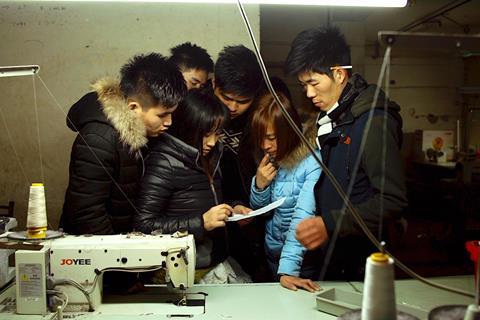Wang Bing turns his intense focus on China’s young clothing factory workers again in this rigorous Competition documentary

Dir: Wang Bing. France/Luxembourg/Netherlands. 2023. 215mins
Chinese documentarist Wang Bing can fairly be described as indefatigable, and tends to demand a similar stamina from his audiences – most notoriously in eight- or nine-hour works such as West Of The Tracks and Dead Souls. His new film Youth (Spring) – the first part of a new series he has announced — is a relatively trim three and a half hours, but it makes a demanding watch, in that it is genuinely, even oppressively immersive. The immersion consists of a concentrated focus on the privately-owned clothing workshops of the city of Zhili and their young workforce, with any extraneous content strictly pared out.
Genuinely, even oppressively immersive
Claustrophobic and indeed repetitive – and clearly intended as such — the film displays the characteristically steely, detached gaze of a rigorous documentarist, and will score with adepts of Wang Bing’s work following its Cannes Competition debut. Yet it is unlikely to overcome the resistance of more casual viewers, with even its relatively brief running time still constituting a tough sell.
Shot over five years, from 2014-19, the film is something of a return to, and expansion on, Wang’s 2016 film Bitter Money, which similarly looked at the garment industry. Youth (Spring) is shot almost entirely within the largely windowless workshops of Zhili, close to Shanghai. It also takes in the austere dormitories, apparently directly above the shops, where the young workforce is billeted. The main location of these places, captions tell us, is ‘Happiness Road’, a form of irony that defies contemplation. And yet, some kind of happiness is on view here, sporadically at least, in the nervy bonhomie and conviviality enjoyed by the young men and women we meet. Captions identify individuals and provide their ages – from late teens, through the 20s, with some in their early 30s – and provinces of origin.
Few of the film’s subjects are at the centre of the action long enough for us really to engage with them as individuals, although particular relationships emerge. At the start, we see the travails of a young pair of co-workers: the girl, Li Shengnan, is pregnant, and her parents (also workers in the industry, seemingly on a management level) argue about whether she should have an abortion or marry her young boyfriend Hu Zuguo.
Throughout, workers find moments for innuendo-laden banter, play-fighting or even canoodling on the shop floor. For the most part, it’s amicable – although a fairly intense fight breaks out early on, with scissors wielded – and youthful stamina seems to prevail; although, towards the end, we see it all taking its toll on one young man.
But for the most part, the labour goes on, and on, with workers cutting or stitching at their machines, sometimes at a furious rate. They work in a stressful atmosphere of relentless noise, sometimes with loud pop music blasting out, and in a state of seeming chaos. It’s remarkable how disorganised and physically cluttered the workspaces are, with little visible management structure in place — let alone recognisable health and safety arrangements.
In between, we see these workers in their sparsely furnished dorms, relaxing with their mobiles, subsisting on street food or instant noodles, eaten perched on their bed – with apparently nothing available in the way of recreational resources. As cameras follow them up and down the staircases and garbage-strewn walkways of the workshop estate, we get next to no sense of an outside world beyond the daily concerns of the job that consumes them – and little sky or daylight either. This is clearly an editorial choice on Wang’s part, to emphasise the claustrophobic, self-enclosed nature of the seemingly inescapable world he depicts. It comes as a welcome relief when we reach a coda in which male worker, Xiao Wei, is seen in the countryside, walking by a river in his home province.
A large swathe of the film – and here the repetition makes a very particular point – is comprised of sequences in which the young workers argue over their pay rates, which seem to be permanently open to recalculation and negotiation. In one sequence, a delegation confronts a boss, who predictably shies away from discussion, shouting them down with a barrage of insults and the age-honoured “times are tough/If you don’t like it here…” rhetoric. It always seems to be up to the young workers to do the relevant maths, and they spend much time in fevered, meticulous calculation.
The result is the depiction of a seemingly sealed-in, quasi-carceral world, revealing how much China’s current economy – after decades, and multiple phases, of Communism – is now built on old-school sweatshop capitalism, with youth a readily available, and very disposable, commodity.
Production companies: Gladys Glover, House on Fire, CS Productions
International sales: Pyramide International, amauruc@pyramideflms.com
Producers: Sonia Buchman, Mao Hui, Nicolas R. De La Mothe, Vincent Wang
Cinematography: Maeda Yoshitaka, Shan Xiaohui, Song Yang,
Liu Xianhui, Ding Bihan, Wang Bing
Editor: Dominique Auvray















![[L-R]: Amanda Villavieja, Laia Casanovas, Yasmina Praderas](https://d1nslcd7m2225b.cloudfront.net/Pictures/274x183/6/4/1/1471641_pxl_20251224_103354743_618426_crop.jpg)








